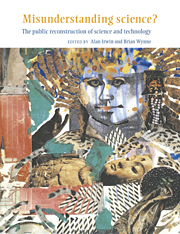Book contents
- Frontmatter
- Contents
- Acknowledgements
- Introduction
- 1 Misunderstood misunderstandings: social identities and public uptake of science
- 2 Science and Hell's kitchen: the local understanding of hazard issues
- 3 Disembodied knowledge? Making sense of medical science
- 4 Now you see it, now you don't: mediating science and managing uncertainty in reproductive medicine
- 5 Ignoring science: discourses of ignorance in the public understanding of science
- 6 Insiders and outsiders: identifying experts on home ground
- 7 Authorising science: public understanding of science in museums
- 8 Nature's advocates: putting science to work in environmental organisations
- 9 Proteins, plants, and currents: rediscovering science in Britain
- Conclusions
- Notes on contributors
- Select bibliography
- Index
2 - Science and Hell's kitchen: the local understanding of hazard issues
Published online by Cambridge University Press: 16 October 2009
- Frontmatter
- Contents
- Acknowledgements
- Introduction
- 1 Misunderstood misunderstandings: social identities and public uptake of science
- 2 Science and Hell's kitchen: the local understanding of hazard issues
- 3 Disembodied knowledge? Making sense of medical science
- 4 Now you see it, now you don't: mediating science and managing uncertainty in reproductive medicine
- 5 Ignoring science: discourses of ignorance in the public understanding of science
- 6 Insiders and outsiders: identifying experts on home ground
- 7 Authorising science: public understanding of science in museums
- 8 Nature's advocates: putting science to work in environmental organisations
- 9 Proteins, plants, and currents: rediscovering science in Britain
- Conclusions
- Notes on contributors
- Select bibliography
- Index
Summary
You'd be more worried if you went round. It would frighten you to bloody death. You'd just see Hell's kitchen – you wouldn't know how they controlled everything.
(Manchester resident discussing possibility of a visit to the local chemical works)In this chapter, the focus is on environmental threats – one of the most topical and pressing areas of public debate and controversy involving science. Rather than considering environmental issues as they relate to global or national concerns, we will focus on immediate questions of pollution and hazard as they affect specific local communities. Whilst Steven Yearley tackles some of these questions in Chapter Eight with regard to environmental organisations, our attention will be concentrated on community residents who have a more ‘everyday’ approach to living in a hazardous environment. Given the present concern over environmental issues, what sources of information exist and how useful do they appear? In what ways do people relate to and ‘make sense’ of those sources of expertise? Going further, we will also consider the relationship between the provision of technical information and the social context within which that information is developed, disseminated, and received.
The central theme of this chapter is, therefore, that of ‘citizens’ and ‘sources’ set against matters of environmental concern. In this we are approaching a topic which recurs throughout this book – albeit, as we will see, from a distinctly ‘local’ and community-oriented perspective. We are also selecting a theme which was identified by the Royal Society as a gap in current knowledge: ‘We therefore also recommend that the sources from which individuals obtain their understanding of science be actively investigated.’
- Type
- Chapter
- Information
- Misunderstanding Science?The Public Reconstruction of Science and Technology, pp. 47 - 64Publisher: Cambridge University PressPrint publication year: 1996
- 62
- Cited by

